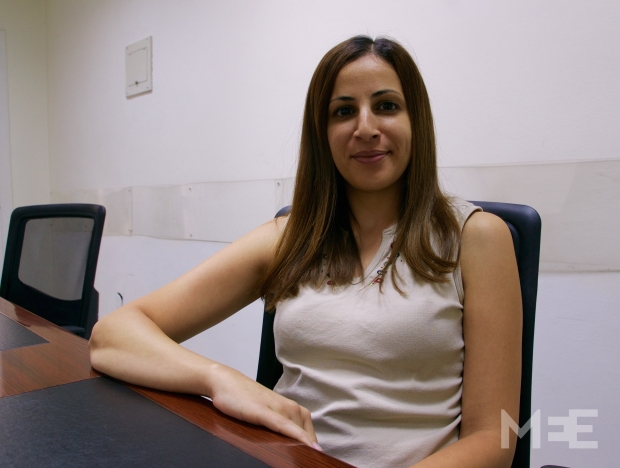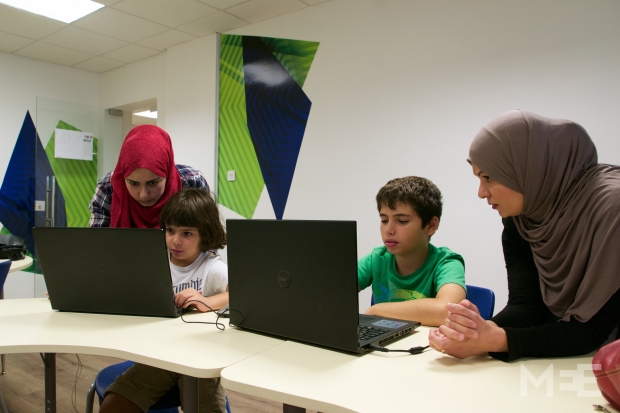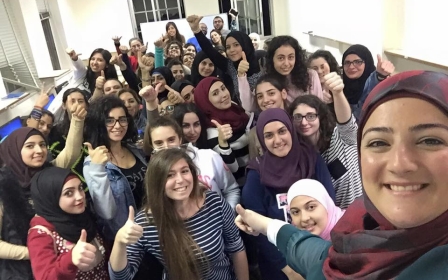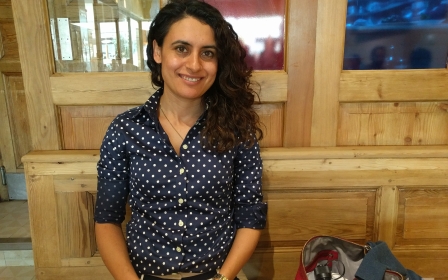Jordanian women IT gurus don't need men by their sides
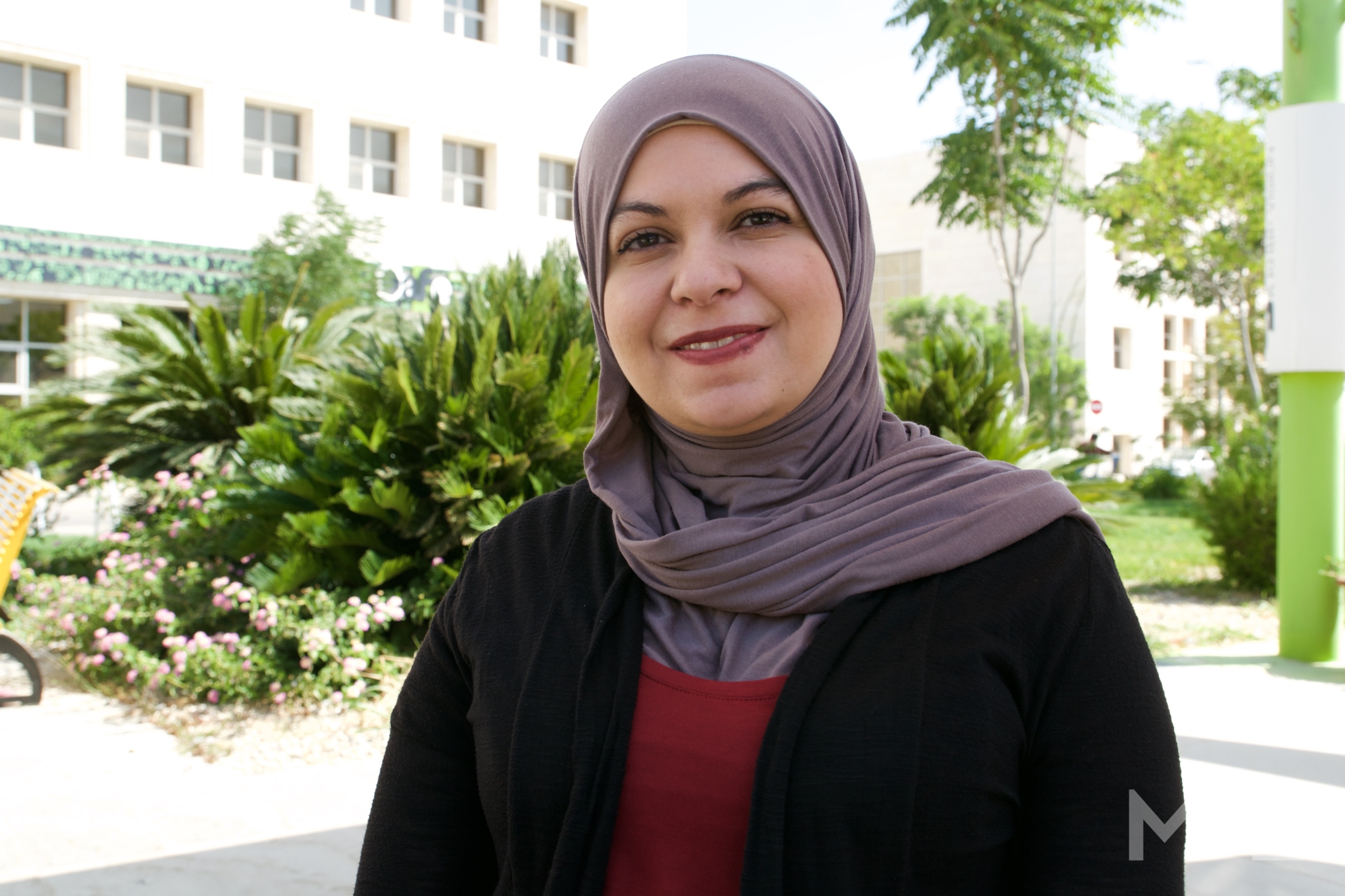
AMMAN - Hanan Khader’s phone rings. She picks it up, only to hang up immediately.
“Where were we?” she asks, having gotten rid of the interruption.
In a busy cafe in King Hussein Business Park in Amman, Khader is trying to explain her mission to train the next generation of computer programmers - girls and women in particular.
“Women are very capable, but for some reason, they don't often make it into the tech world,” the 37-year-old owner of a coding academy tells MEE. “They have very strong analytical and computational skills, but men dominate overwhelmingly in these fields, which should not be the case.”
Since Jordan is striving to position itself as the Middle East's tech hub, it needs to harness all of its citizens' skills in information and communications technology (ICT). But while there are as many women as men graduating in computer science - women only make up a third of the industry's workforce - a ratio similar to Israel’s 36.2 percent.
The gender gap is particularly glaring in programming. "I don't remember working with female programmers in all of my career years," says Khader.
A foot in the door
Part of the problem is that many of the women who are trained in tech drop out of the workforce entirely once they graduate. According to UN Women, 67.6 percent of Jordanian women are inactive in the labour market. “Girls are doing really well in school, but when it comes to looking for jobs, a lot of them would rather get married and stay at home,” explains Tamara Abdel Jaber, an advisory board member for Girls in Tech Jordan, a non-profit focused on the engagement, education and empowerment of girls and women who are passionate about technology.
“Even if they are looking for a job, it’s something temporary that would allow them to meet potential husbands,” she continues. And if a woman does opt to work, she is more likely to head for sectors such as education and healthcare because of the family-friendly working hours.
Some female programmers, though, are working hard to break the mould.
For Yara Alkhader, chief technical officer at her own educational services company, SA3ED.ME, the creative possibilities of programming first inspired her to become a back-end developer. “I’m really happy after I write code and it becomes functional and I see it work," she explains. "It’s like composing music.”
When applying for her first position after she graduated in 2001, she found the experience overwhelmingly positive. “I think my application process was accelerated because I was a female,” she says. Some companies prioritise hiring women, but like all recruits, Alkhader had to pass exams to secure a job and she still holds the record for the best qualification scores in that company’s history.
However, despite attempts of positive discrimination, women are still in the minority in the tech workplace and it is not necessarily an easy place to be.
Company policies ‘stacked’ against women
Moayyad Faris was not particularly surprised to discover there were no women on his team when he joined Mawdoo3.com five months ago. While females make up 80 percent of the company workforce, there are currently no women programmers.
“Within 10 years of working in development in Jordan, I have only worked with two women," he says. "They were really very good and I liked to work with them."
He describes the cultural stereotyping that leads managers to hire men, not women: women need more time off to care for their families. “When a woman gets married or has a sick child, she has to take leave from work," he continues. "From the company’s perspective, it cannot afford to lose employees for one month or two months for such situations.”
He, too, agrees that the industry needs women's skills. But "it depends on the managers to make a plan to solve this problem”.
Dr Vivek Wadhwa, an expert on gender and technology at Drake University, explains that, particularly in Jordan, women face challenges their male colleagues do not. “[Women] don't get support from their families and peers, he says. "Investors and business partners don't take them seriously. They don't have enough role models. The deck is stacked against them."
The slippery corporate ladder
Even for a dedicated female programmer, career progression is not easy and promotion is rare. Women, agrees Alkhader, face more pressure to uphold family commitments than men, preventing them from socialising after hours and depriving them of valuable workplace connections that lead to promotions.
“You have to work ten times harder to prove yourself and to show that you’re competent enough to go further in your career,” says Alkhader. “From an abstract point of view, you feel sorry because sometimes you feel like men are getting better opportunities than women. [Men] have a life together after work, so they have an opportunity to network and bond, making it easier for them to support and promote each each other," she continues, "and that is something that the women don’t really get."
And as women try to climb the corporate ladder, they face challenges that are tied to traditional gender stereotypes in Jordanian society. "Even as kids, we’re told that a female is different from a male," she says. It seems harder for men to take orders from women, even if you have specific tasks for them," Alkhader explains.
Having held management positions for much of her career, Hanan Khader recalls a similar experience. She tells MEE of a time a male subordinate was dismissive of her when she offered to help him solve a technical problem. "I said, 'Let me help you,' and he said offhandedly and somewhat condescendingly, 'No, you won't be able to help me'".
To his astonishment, Khader solved the problem within 30 minutes and handed the solution to her colleague. "I think he learned a very strong lesson that he should not underestimate anyone's capabilities - especially women’s," she says.
Entrepreneurship: A tool for success?
One way women in Jordan have circumvented the challenges of a male-dominated company is by avoiding them entirely. “In the past couple of years," says Abdel Jaber, "we have seen more women founding and owning start-ups.” In this way, they are able to take control of their career paths in programming and technology.
Indeed, after 15 years of working for others, Hanan Khader founded her own start-up, Hello World Kids. While teaching coding skills to her three children, she decided to open an academy and create a curriculum designed for students as young as eight. A year-and-a-half later, more than 1,200 students - half of them girls - have attended her classes. The textbooks are used in schools across Jordan and also are being piloted in the Netherlands and the United States.
Khader designed the school's curriculum and textbooks to send a clear message to her young students. Unusually, the books include pictures of young women programmers. “This is a message for the little girls: ‘She’s a programmer. I can be like her'." explains Khader. "While in so many other books, it’s mostly the boys who are portrayed as being smart,” she says.
Determined to thoroughly invert the status quo, Khader’s teaching staff is also entirely female - with the exception of one new male recruit. “We need more women in technology and innovation to empower themselves and be productive in the community,” she says. And despite the previous barriers to female progress in Jordan, she believes the status of women in programming is changing. “By seeing successful examples, the male mind-set is certainly changing," she says. "Respect for women’s capabilities have increased and improved.”
Inspiring the next generation
10-year-old Jana Bdour is one of the first students to arrive at Hello Kids World for her coding class. After setting up her laptop, she stares at the screen, concentrating with a furrowed brow on the coding challenge Khader has assigned the class. “I like programming,” she tells MEE. “If I learn how to code now, I will become a good programmer in five years and then I'll be a real young female programmer.”
Women like Khader are role models for Bdour, as they break long-engrained gender barriers through their work. They are inspiring her generation to push the boundaries even further. “I hope we will have a very significant and important role in the field,” explains the budding programmer.
But women will need some help and young Bdour has some advice for how companies - and society - can help them continue on the road to equality. “Support young girls by giving them scholarships to study programming and writing codes in advanced academies," she says. "This will help break the gender barriers.”
With a little encouragement, this new generation of girls could make Jordan's tech future a very bright one.
New MEE newsletter: Jerusalem Dispatch
Sign up to get the latest insights and analysis on Israel-Palestine, alongside Turkey Unpacked and other MEE newsletters
Middle East Eye delivers independent and unrivalled coverage and analysis of the Middle East, North Africa and beyond. To learn more about republishing this content and the associated fees, please fill out this form. More about MEE can be found here.


